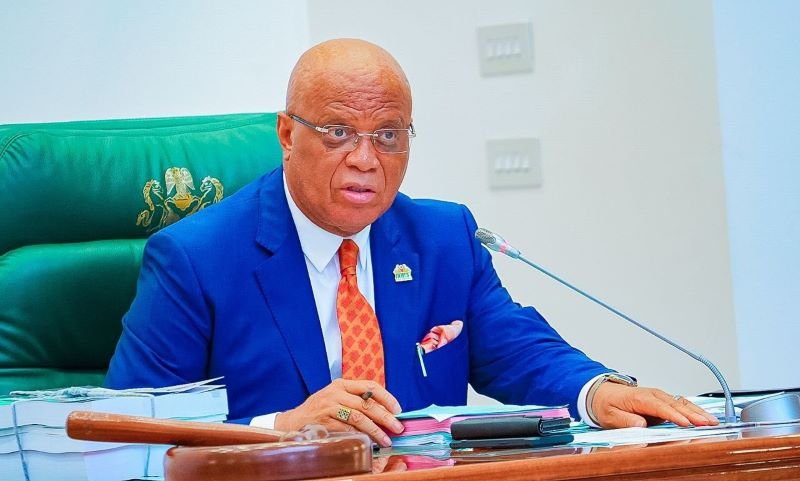PRESSURE is mounting in Akwa Ibom State as public sector workers, including university lecturers, teachers, and civil servants, have embarked on a strike to protest the nonpayment of their salaries for the months of May and June.
News Point Nigeria reports that the backlash comes just one month after Governor Umo Eno defected from the Peoples Democratic Party (PDP) to the All Progressives Congress (APC) in a widely publicised event in Uyo.
His political switch was justified at the time as a strategic move to “unite the state” and “secure federal support” for key developmental projects, such as the long-delayed Ibom Deep Seaport.
However, the reality on ground tells a different story: frustration, protests, and increasing public scrutiny over the governor’s financial priorities.
On Friday, academic and nonacademic staff of Akwa Ibom State University (AKSU), which operates campuses at Obio Akpa and Ikot Akpaden, took to the streets in protest over the unpaid wages.
They stormed the office of Frank Ekpeyong, Commissioner for Science and Digital Economy, whose department reportedly oversees the newly digitised payroll system that has become the center of controversy.
Holding placards that read “Pay us our salaries” and “We also have families to feed,” the workers demanded:
Immediate payment of May and June salaries
Payment of 8-month arrears from the new minimum wage implementation
Clarification on the status of payroll management
“We’ve not been paid for two months, and yet the government has money to buy cars worth over N100 million each for politicians,” said one protester who asked not to be named. “How are we supposed to survive?”
The protesters also criticized the recent distribution of luxury vehicles by the state government. Within the last week, each of the state’s 31 local government chairmen reportedly received a brand-new vehicle worth over N100 million.
Earlier, top politicians, including former deputy governors, were also gifted exotic cars valued at around N130 million each.
These lavish expenses have sparked outrage among ordinary citizens and civil servants who accuse Governor Eno of neglecting the welfare of the state’s workforce in favour of appeasing political elites.
In a response to media queries, Aniekan Umanah, the state Commissioner for Information, blamed the salary delays on the recently concluded civil service verification exercise.
According to him, the payroll audit uncovered a number of ghost workers, prompting the government to restructure the salary disbursement process. Umanah claimed that while the delay is regrettable, it was a necessary step to cleanse the system and improve fiscal accountability.
He added that Governor Eno’s administration plans to recruit 3,000 new workers into the state’s civil service, based on the gaps revealed during the exercise.
“The workers will be paid as soon as the issues are fully sorted,” Umanah assured, without providing a firm date for payment.
Governor Eno, who was elected in 2023 on the PDP platform—a party that has governed Akwa Ibom since 1999—shocked many with his sudden defection to the ruling APC in June 2025.
While the move was publicly framed as a push for unity and development, analysts suggest that Eno’s defection has created internal discontent, both within the civil service and among political actors in the state.
Some critics allege that the salary delays may reflect financial mismanagement or political distractions linked to the realignment of power dynamics following the governor’s switch in party affiliation.
As the strike continues, pressure is mounting on Governor Eno’s administration to act decisively. Workers are growing impatient, and opposition voices are gaining momentum as accusations of elitism, fiscal irresponsibility, and neglect dominate the public discourse.
While the state government maintains that the delay is technical and will be resolved shortly, the unfolding events suggest a deeper governance crisis that may prove costly for a relatively new administration already battling the fallout of a high-stakes political defection.








